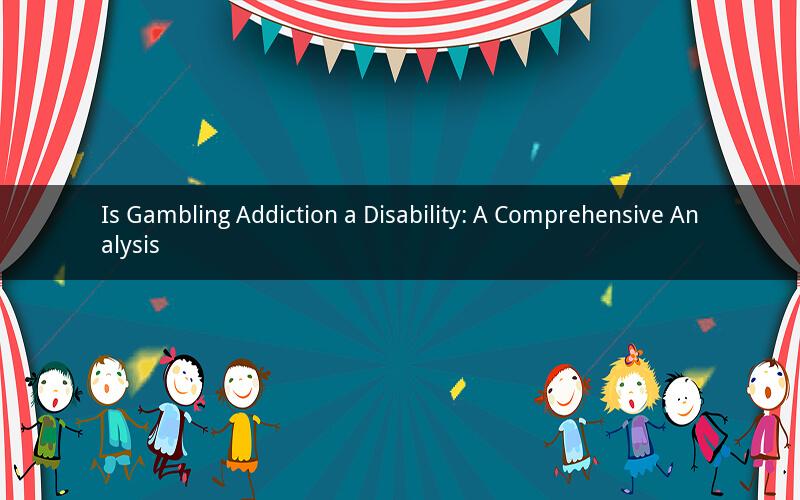
Gambling addiction has long been a subject of debate among experts in various fields. With the increasing number of individuals struggling with this issue, the question of whether gambling addiction should be classified as a disability has gained significant attention. This article aims to delve into this topic, exploring the various perspectives and arguments surrounding it.
1. Definition of Gambling Addiction
Gambling addiction, also known as compulsive gambling, is a behavioral addiction characterized by an inability to control or stop gambling despite the negative consequences it may bring. It is considered a mental health disorder by the American Psychiatric Association (APA) and the World Health Organization (WHO).
2. The Classification of Gambling Addiction as a Disability
The classification of gambling addiction as a disability depends on the legal and ethical framework of different countries. In some jurisdictions, gambling addiction is recognized as a disability, providing individuals with certain rights and protections. However, in others, it is not classified as a disability, which may lead to discrimination and limited access to support services.
2.1 Arguments in Favor of Classification as a Disability
Supporters of classifying gambling addiction as a disability argue that it is a legitimate mental health disorder that can significantly impair an individual's functioning in various aspects of life. Here are some key points:
a. Similarities to Other Mental Health Disorders: Gambling addiction shares many similarities with other recognized mental health disorders, such as substance use disorder and bipolar disorder. It affects an individual's emotions, thoughts, and behaviors, leading to impaired social, occupational, and personal functioning.
b. Need for Support and Treatment: Individuals with gambling addiction require professional support and treatment to overcome their addiction. Recognizing it as a disability can ensure that they have access to the necessary resources and services.
c. Protection against Discrimination: By classifying gambling addiction as a disability, individuals with this condition can receive protection against discrimination in employment, housing, and other areas.
2.2 Arguments Against Classification as a Disability
Opponents of classifying gambling addiction as a disability argue that it is not a disability in the traditional sense and should not be given the same legal status as other disabilities. Here are some of their key points:
a. Voluntary Behavior: Unlike other mental health disorders, such as schizophrenia or bipolar disorder, gambling addiction is considered a voluntary behavior. This raises questions about whether it deserves the same level of protection as other disabilities.
b. Lack of Uniform Criteria: There is no universally accepted definition or criteria for diagnosing gambling addiction. This makes it challenging to determine who should be classified as having a gambling addiction, potentially leading to inconsistencies in the application of disability rights.
c. Potential for Abuse: Recognizing gambling addiction as a disability could potentially lead to individuals exploiting the system for financial gain, as they might claim to have a gambling addiction to receive disability benefits.
3. Impact on Individuals and Society
Whether gambling addiction is classified as a disability or not, it has a significant impact on individuals and society. Here are some key points:
a. Personal Impact: Gambling addiction can lead to severe financial, emotional, and social consequences for individuals. It can cause relationships to deteriorate, financial ruin, and even suicidal thoughts.
b. Economic Impact: The economic impact of gambling addiction is substantial. It can lead to lost productivity, increased healthcare costs, and the need for social services to support individuals struggling with this addiction.
c. Social Impact: Gambling addiction can have a negative impact on communities, as it may lead to increased crime rates, poverty, and social problems.
4. Conclusion
The question of whether gambling addiction should be classified as a disability is complex and multifaceted. While there are valid arguments on both sides, it is crucial to recognize the significant impact that gambling addiction can have on individuals and society. Further research and discussion are needed to develop a comprehensive approach to address this issue and ensure that individuals with gambling addiction receive the necessary support and protection.
5. Related Questions and Answers
Q1: What is the primary argument against classifying gambling addiction as a disability?
A1: The primary argument against classifying gambling addiction as a disability is that it is considered a voluntary behavior, whereas other mental health disorders are not.
Q2: How can gambling addiction affect an individual's personal life?
A2: Gambling addiction can lead to financial ruin, emotional distress, strained relationships, and even suicidal thoughts.
Q3: Why is there a lack of uniform criteria for diagnosing gambling addiction?
A3: The lack of uniform criteria for diagnosing gambling addiction stems from the varying definitions and approaches to understanding this mental health disorder.
Q4: Can individuals with gambling addiction receive protection against discrimination if it is not classified as a disability?
A4: Even if gambling addiction is not classified as a disability, individuals can still seek protection against discrimination through other legal means, such as anti-discrimination laws.
Q5: What role can society play in addressing gambling addiction?
A5: Society can play a crucial role in addressing gambling addiction by providing education, support services, and advocating for the recognition of gambling addiction as a legitimate mental health disorder. Additionally, promoting responsible gambling practices and raising awareness about the risks associated with gambling can help reduce the prevalence of gambling addiction.